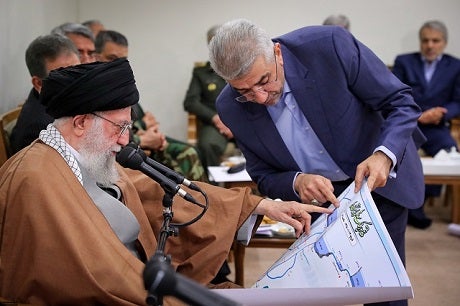Flash flooding in northern and western provinces of Iran has killed almost 60 people and forced thousands from their homes in recent days.
Struggling with the magnitude of the disaster, Iran urgently needs international support. However, Tehran says US sanctions on its banking sector have obstructed the flow of aid and equipment.
US officials responded to the claim, arguing the flooding disaster has been made worse by “Iranian regime mismanagement in urban planning and in emergency preparedness”.
Two weeks of torrential rainfall has led to widespread flooding, forcing the government and the Islamic Revolutionary Guard Corps (IRGC) to deploy thousands of troops to assist flood victims.
Iran has also deployed army helicopters to assist with rescue missions.
Foreign Minister Javad Zarif accused the administration of US President Donald Trump of “economic terrorism” for “impending aid efforts by #IranianRedCrescent to all communities devastated by unprecedented floods”.
.@realDonaldTrump ‘s "maximum pressure"—flouting UNSC Res 2231 & ICJ ruling—is impeding aid efforts by #IranianRedCrescent to all communities devastated by unprecedented floods. Blocked equipment includes relief choppers: This isn't just economic warfare; it's economic TERRORISM. pic.twitter.com/EEKTMiXLEi
— Javad Zarif (@JZarif) April 1, 2019
Bahram Qasemi, Iran’s foreign ministry spokesperson, told state news agency IRNA the US has blocked the Iranian Red Crescent’s accounts making it impossible for international aid to reach Iran.
Since the sanctions were re- imposed in November, the US has cut off Iran’s central bank and several other banking institutions from the worldwide messaging service known as SWIFT, which allows money to be transferred across the global banking system.
Washington has imposed one of its most stringent sanctions regimes on Iran. As a result, global firms and agencies are keen to avoid all dealings with Iran. This is despite Washington’s repeated assurances that the sanctions do not apply to humanitarian aid.
“The United States stands ready to assist and contribute to the International Federation of Red Cross and Red Crescent Societies, which would then direct the money through the Iranian Red Crescent for relief,” Secretary of State Mike Pompeo said in a press statement Tuesday.
“The regime blames outside entities when, in fact, it is their mismanagement that has led to this disaster. They even jail environmentalists for attempting to help Iran prepare for these very issues,” Pompeo said, referring to the case of eight environmentalists recently jailed for more than a year.
Ayatollah Ali Khamenei, Iran’s supreme leader, appeared to recognize Iran's failings when he summoned top officials to his residence in Tehran on Wednesday, including the heads of the IRGC and the army.
 Iranian Energy Minister Reza Ardakanian shows Ayatollah Ali Khamenei the government's response to flooding, April 3, 2019. Photo: Office of Ayatollah Ali Khamenei
Iranian Energy Minister Reza Ardakanian shows Ayatollah Ali Khamenei the government's response to flooding, April 3, 2019. Photo: Office of Ayatollah Ali Khamenei
Although he praised their efforts in Iran’s flood-hit provinces, Khamenei accused officials of failing to plan for such a calamity.
Rivers and dam should have been dredged, watersheds better managed, forests and trees protected, and the route of the rivers redirected, he said.
“This should be an eventual lesson so that in future the design and construction of dams, roads, railways, and urban development, in every aspect, is taken into account in thorough and vital future planning.”
The Iranian Red Crescent posted a story on its website on Monday which also appears to contradict Tehran’s narrative that aid is being blocked.
It said the United Nations Office for the Coordination of Humanitarian Affairs (OCHA) in Iran, the International Federation of Red Cross and Red Crescent Societies (IFRC), the UK Red Cross, and the Norwegian Ambassador to Tehran Lars Nordrum have all expressed their readiness to provide assistance to Iran to deal with the flooding crisis.
Rudaw has reached out to the Red Cross and the Iranian Red Crescent to comment on the claims. It is yet to receive a response.
Last updated 4.10 p.m.




Comments
Rudaw moderates all comments submitted on our website. We welcome comments which are relevant to the article and encourage further discussion about the issues that matter to you. We also welcome constructive criticism about Rudaw.
To be approved for publication, however, your comments must meet our community guidelines.
We will not tolerate the following: profanity, threats, personal attacks, vulgarity, abuse (such as sexism, racism, homophobia or xenophobia), or commercial or personal promotion.
Comments that do not meet our guidelines will be rejected. Comments are not edited – they are either approved or rejected.
Post a comment